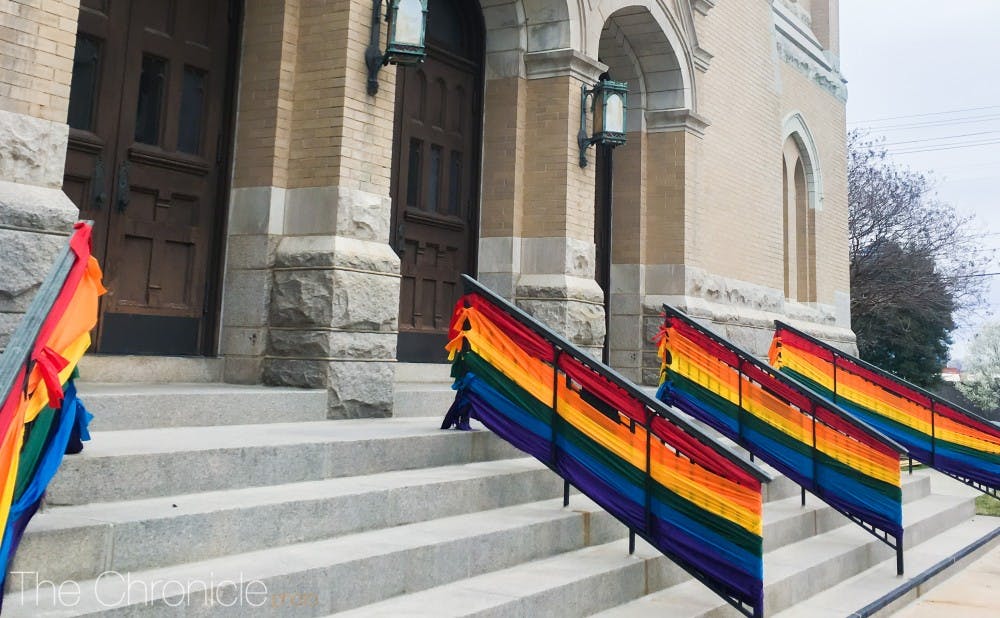The Chronicle, along with The New York Times and other major news outlets, has reported on the United Methodist Church (UMC)’s vote during a February 26th special session of the General Conference to tighten its ban on LGBTQ clergy and same-gender marriage. This controversial decision deepened the rift between its progressive and conservative leaders and 12.5 million members worldwide and increased the possibility of a historic split. There are also implications for UMC-affiliated universities like Duke.
On January 5th, in anticipation of the upcoming General Conference vote, Duke and 92 other UMC-affiliated colleges and universities, unanimously approved a joint statement citing the Church’s historic and profound commitment “to the sacred worth of all persons and to social justice, such as the Church’s position on civil rights, women’s rights, and the rights of different ethnic communities” and calling upon UMC leaders “to honor the past and current practices of inclusion by amending their policies and practices to affirm full inclusion in the life and ministry of the United Methodist Church of all persons regardless of their race, ethnicity, creed, national origin, gender, gender identity/expression or sexual orientation.” Michael Schoenfeld, vice president for public affairs and government relations, said the statement “is consistent with Duke’s longstanding commitment to diversity and inclusion.”
At the UMC General Conference, the majority of Church leaders disappointingly doubled down on their discriminatory practices by reaffirming the Book of Discipline which bars “self-avowed practicing homosexuals” from being ordained as ministers and forbids pastors from conducting same-gender marriage. They even voted to enhance punitive actions against clergy and employees who violate the policy by refusing to discriminate.
In his February 26th statement about the UMC’s decision, Dean Jones opened with “sighs too deep for words” and asserted that “we will work to ensure that all are welcome to pursue study and preparation for Christian ministry at Duke Divinity School.” However, he conceded that “Duke Divinity School receives significant financial support from and is accountable to the denomination in the preparation of United Methodist women and men for ministry” and that the school will “continue to seek to create a community where people committed to Christian ministry can disagree about matters of sexuality [emphasis added].” The LGBTQ community is entitled to far more than “sighs too deep for words” and prayers “for wisdom and charity.” Disagreement is a far cry from institutionalized discrimination, and while you are sighing, we are dying. We recall the ACT UP motto “SILENCE = DEATH” in response to the United States and other governments’ initial inattention to the AIDS pandemic, which resulted in millions of lives lost. We remind Duke and other university leaders that allowing institutionalized discrimination against LGBTQ people to continue unchecked creates an environment conducive to harassment and violence that will result in more suffering and lives lost and is in direct violation of your own institutions’ Equal Opportunity/Affirmative Action and Diversity and Equity policies and programs and the Universal Declaration of Human Rights.
We look to Duke to take a leadership role alongside the 92 other UMC-affiliated colleges and universities and take a strong and unequivocal stance against the institutionalized discrimination being carried out by the Church. Duke’s UMC affiliation and renowned divinity school place it squarely and visibly in the middle of this conflict, and its international reputation among higher education institutions gives it the stature to take an influential leadership stance. Duke was named in The New York Times front page article about the UMC’s recent vote and has been named by other major news outlets. Duke’s clout is unquestionable, and so its leadership can be meaningful. It has an effective bully pulpit; the phrase was never more apt.
Duke has historically displayed courageous leadership in this area and enhanced its reputation by doing so. As Chapel Dean, Bishop Will Willimon opened the Duke Chapel to same-gender ceremonies well in advance of marriage equality laws, which allowed Duke to show moral leadership and institutional integrity by advancing the righteous cause of LGBTQ equality on campus and nationally.
There is an undeniable conflict between Duke’s anti-discrimination policies and the institutionalized discrimination being practiced by the UMC. This dissonance cannot endure for long without having a corrosive effect on the sincerity of Duke’s publicly-stated commitment to diversity, inclusion, and belonging for all, including LGBTQ people. Without decisive leadership, Duke’s moral authority, strongly exercised to good effect in the past, will become an example of hypocrisy and abandoned leadership, undermine its history of admirable action, and cast a long shadow on Duke’s reputation.
Duke must either publicly and energetically lead action that ends the discrimination, or it must break ties with the institution that promotes it. We welcome dialogue, and more importantly, action on this matter.
We invite supporters of this call to action to submit their signatures here.
Sincerely,
Jin-Soo Huh T '09, President, Duke LGBTQ Network Board
Thomas Clark T '69, Founding Chair, Duke LGBTQ Network Board and first openly-LGBTQ Trustee of Duke University
Katherine Turner T '90, Co-Chair, Diversity and Membership Committee, Duke LGBTQ Network Board
On behalf of the Duke LGBTQ Network Board
Get The Chronicle straight to your inbox
Sign up for our weekly newsletter. Cancel at any time.

